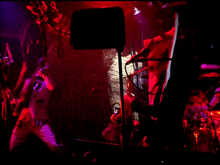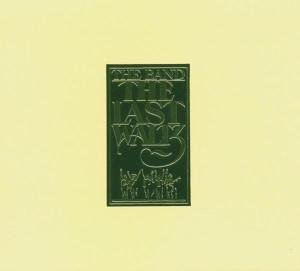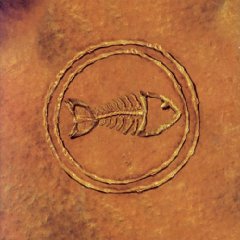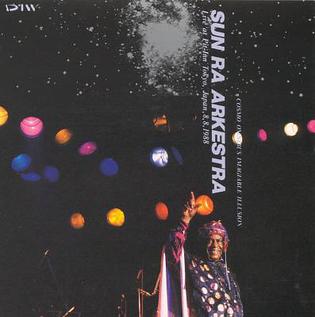Biography
2002/2003
Sebkha-Chott's first singer, Mustach'Man, joins the band, charismatic character who is going to lead the band in a theatrical way of performing shows. Mustach'Man will enter several characters in a single show. From this moment on, Sebkha-Chott's shows take the shape of burlesque theater, deploying the universe of an absurd dictatorship, led by a Joke Tyrant. This change is essential, as it's the beginning of the systematical use of mythological characters in every actions of Sebkha-Chott.
The album De l'Existence de la Mythologie Chottienne en 7 Cycles is recorded during 2002/2003, and is released at Autumn 2004, without any distribution at first. This album is distributed by Musea Records since 2006, under Musea Parallèle label.
Vedior Bis joins Sebkha-Chott as a sophisticated narrator.
During this recording session, comte Benito Del Amafia is replaced by Cristobal Del Amafia. They will play together in a unique show to Frank Zappa.
2004
- De l'Existence de la Mythologie Chottienne en 7 Cycles is released.
- Antòn Pinokiov leaves the band and is replaced by MerouMan.
- Horn section leaves Sebkha-Chott and is replaced by Comte P.A.Squale Del Amafia on alto and soprano saxophones,
- Tzom Trümb becomes Sebkha-Chott's trombone player shortly before P.A. Squale Del Amafia leaves the band.
2005
Mustach'Man leaves the band to enter a new chanson project called La Muette. He's replaced by Hrabe Black Sebbath (vocals) and Comtesse Gnania Del Amafia (vocals). Electronic Machines are integrated as Siphon Trounezöhle (machines) takes place in the band. Shortly before summer, MerouMan announce he will leave soon, and Capt'n Roses (guitar) replaces him. Both of them will play together on Nagah Mahdi. Nagah Mahdi's recording session is done during summer 2005, in MJC Plaine du Ronceray. For this purpose, Labial Aerostick, P.A.Squale Del Amafia et Mustach'Man reintegers the band, as well as many guests: Grümse (vocals - Electro Addict Band), Arno (vocals - Carnival in Coal), Petit Zornbergette (tap dance - Mentat Routage), David Rabillet (cajon), Mimetic Angel (vocals), Guilty (turntables - Anes et Bateaux / DJ Guilty), Jules Lefranc Gaulois Kaïser (percussions), VaGoDor Deu Sahpun (baritone saxophone), GenBaku (sound painting).
After a computer crash, part of the recording is lost. New recording sessions are made in October 2005. Release dare is rescheduled.
Alter Frabrovitch is replaced by Benoît Popol II on keyboards. VaGoDor Deu Sahpun joins Sebkha-Chott on baritone saxophone, and Jules Lefranc Gaulois Kaïser does the same on percussions.
2006
Hrabe Black Sebbath leaves the band ; Wladimir Ohrelianov II, Benoît Popol II and Capt'n'Roses take the male vocals part. Nagah Mahdi - Opuscrits en 48 Rouleaux is released on Musea Parallèle, giving to Sebkha-Chott international visibility. De l'Existence de la Mythologie Chottienne en 7 Cycles is distributed by the same label from that date on. Nagah Mahdi'reviews are success, especially in the progressive rock ring.
Comtesse Del Amafia leaves Sebkha-Chott.
2007
Sebkha-Chott launches its first thematic tour, called Opération Coin Coin. They meet Sleepytime Gorilla Museum twice at this occasion. This meeting is of great importance concerning the future orientations of Sebkha-Chott.
2008
During summer, Sebkha-Chott simultaneously records [[Nigla[h] - Tapisseries Finex en XXX Strips et LXX/X Trompettes|Nigla[h]]] and De la Persistance onboard of Péniche Excelsior on the AMMD's studio. At the end of this recording sessions, Benoît Popol II and Jules LeFranc Gaulois Kaïser leaves the band. Keyboard will be shared by Wladimir Ohrelianov II and Tzom Trümb (through a MIDI vibe), and percussions will be played by Yüla Slipobitch mainly.
On 30 October, [[Nigla[h] - Tapisseries fines en XXX Strips et LXX/X Trompettes]] is released on Musea Records. This album sets a turning point by being much more dark and obscure than the previous ones, Sleepytime Gorilla Museum's being clearly hearable.
The band tours in Europe with Canadian band Unexpect to support the album. After this tour, Capt'n'Roses leaves the band. Sebkha-Chott enters a doubt period.
2009
During this period, some choices are made, VaGoDor Deu Sahpun and Siphon Trounezöhle leave the band.
Wladimir Ohrelianov II and Yüla Slipobitch décide to go on by integrating electronic machines in an intensive way, which is a historic will of the band, never made real due to lack of time.
De la Persistance de la Mythologie Chottienne en ??? Vélos is released on Musea Records.
Tzom Trümb leaves the band as Souv Ponky Ponk joins it on saxophone and lights management altogether with Cousin Sub on guitar and audioproduction. The shape is then double semi-quatuor, first half being on stage (Wladimir Ohrelianov II and Yüla Slipobitch) the other half being at FOH (Cousin Sub and Souv Ponky Ponk).
Mainly, this year is spent by setting up the new show and the machines/lights/VJing synchronization system. This system is based on free software only.
During summer, Cousin Sub leaves guitar and keeps only audio production. Wladimir Ohrelianov II takes the guitar added to the bass. Souv Ponky Ponk leaves FOH to get on stage.
2010
Sebkha-Chott goes back on tour, and cross road with Extra Life, another important meeting, which let the band even more sure about the new way he works sound as a global material.
During Summer, Sebkha-Chott plays at Zappanale, a German festival in celebration of Frank Zappa, sharing the line-up with Napoleon Murphy Brock, Robert Martin, Ike Willis...
From this tour, it appears that the technical setup is a bit too complex to prepare on stage ; the band goes back working on it to make it easier to use.
[[Ne[XXX]t Epilog]] recording sessions begin during Winter.
2011
This year is mainly spent mixing the Ne[XXX]t Epilog and building new parts of the setup.
A new character appears: Tupac Promo, a character destined to communicate in Moron Languages with terrestrial people.
2012
Cousin Sub leaves Sebkha-Chott.
On Spring, Sebkha-Chott starts a new tour called The Ne[XXX]t Tour.
Ne[XXX]t Epilog v1.0 is physically released 2012, September the 22nd on AMMD / Musea Records / Dogmazic. The official announcement [6] precises that the album will be digitally liberated on 2012, October the 18th on Spider Jessica's website.
Line-up history
- Bass: Wladimir Ohrelianov II (1999 → today)
- Drums: Yüla Slipobitch (1999 → today)
- Guitars:
- Antòn Pinokiov (2000 → 2004)
- Merouman (2004 → 2005)
- Capt'ain Roses (2005 → 2008)
- Siphon Trounezöhle (2008)
- Cousin Sub (2009)
- Wladimir Ohrelianov II (2009 → today)
- Keyboards:
- Alter Frabrovitch (2000 → 2005)
- Benoît Popol II (2005 → 2008)
- Wladimir Ohrelianov II (2008)
- Saxophones:
- Labial Aerostick - alto (2002 → 2004)
- Comte P.A.Squale Del Amafia - alto/soprano (2004)
- VaGoDor Deu Sahpun - alto/soprano/baritone (2005 → 2009)
- Souv Ponky Ponk - alto/baritone (2009 → today)
- Trombones:
- Marx Bronosov (2002 → 2004)
- Tzom Trümb (2004 → 2009)
- Trumpets:
- Benito Del Amafia (2002 → 2003)
- Cristobal Del Amafia (2003 → 2004)
- Percussions:
- Jules LeFranc Gaulois Kaïser - congas/davul/industrial percussions (2005 → 2008)
- Tzom Trümb - vibes (2008)
- Yüla Slipobitch - Tubular Bells, Glockenspiel (2009 → today)
- Vocals:
- Mustach'Man (2003 → 2005)
- Hrabe Black Sebbath (2005 → 2006)
- Gnania Del Amafia (2005 → 2006)
- Yüla Slipobitch (2005 → today)
- Wladimir Ohrelianov II (2006 → today)
- Benoît Popol II (2006 → 2008)
- Capt'n Roses (2006 → 2008)
- Souv Ponky Ponk (2009 → today)
- Machines:
- Siphon Trounezöhle (2005 → 2009)
- Wladimir Ohrelianov II (2003 and 2009 → today)
- Souv Ponky Ponk (2009 → today)
Live Show Experiences
Sebkha-Chott's shows are the very moment in which Ohreland exists. In each concert, a hierarchy is established between Sebkha-Chott's Kourt and the audience (which takes the role of the people).
The atmosphere in Sebkha-Chott's show is quite particular: the absurd basement is such that the content might not be taken seriously, though, the audience solicitation is so strong (especially when the audience doesn't react spontaneously) that kind of an embarrassment or even mistrust might occur. Whatever might be the audience reactions, Sebkha-Chott's Kourt lays on them to build the show. Each concert thus is a unique event, as neither the setlist, nor the speeches are defined by advance. Still, there are some never-changing things: the shows open on a triumphal incoming of the Kourt (since 2007), which quickly leads to Tyrant's speech, and they end up on the death of every member of Sebkah-Chott's Kourt, killed by the Tyrant, mainly.

















